#Olam
Explore tagged Tumblr posts
Text

Our Lamb Amidst Mortals won the best BL award in the spooktober vn 2024 game jam on itch!!! THIS IS HUGE !! Thank you to to the game lead Duel for letting me design and draw these guys! I'm super proud of the whole team for putting their all into making this game! Props all around!
And if you haven't played it, now you should! Click here to play!
6 notes
·
View notes
Text
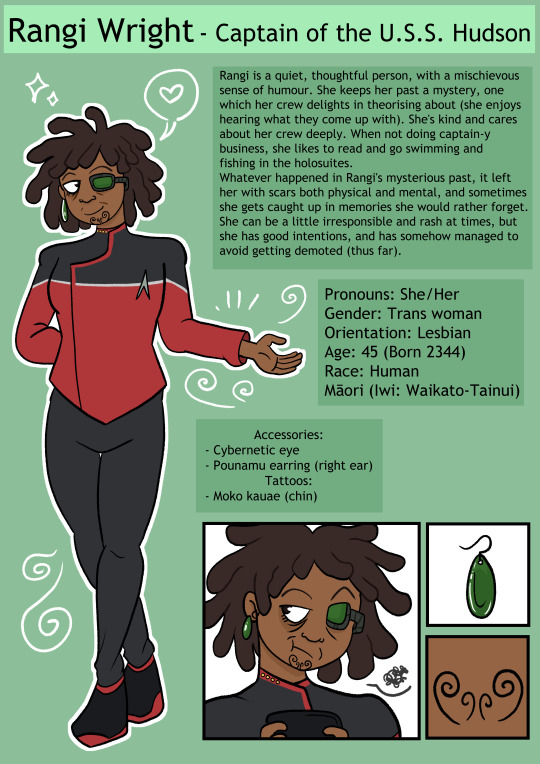
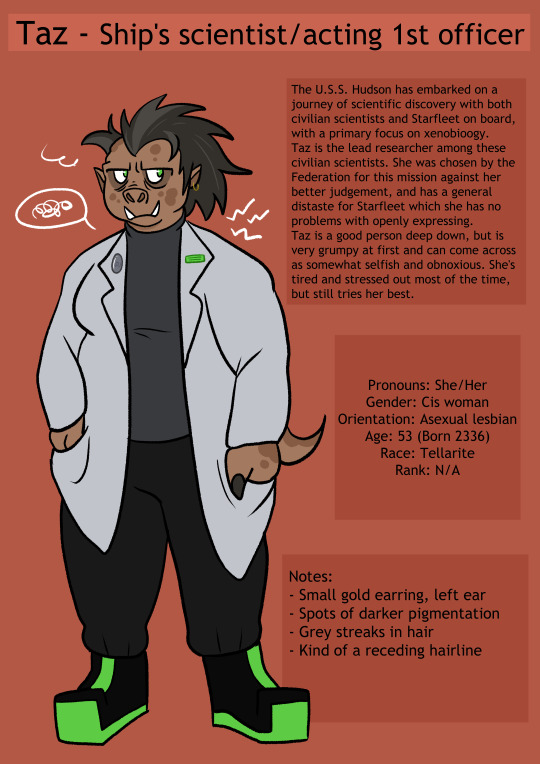

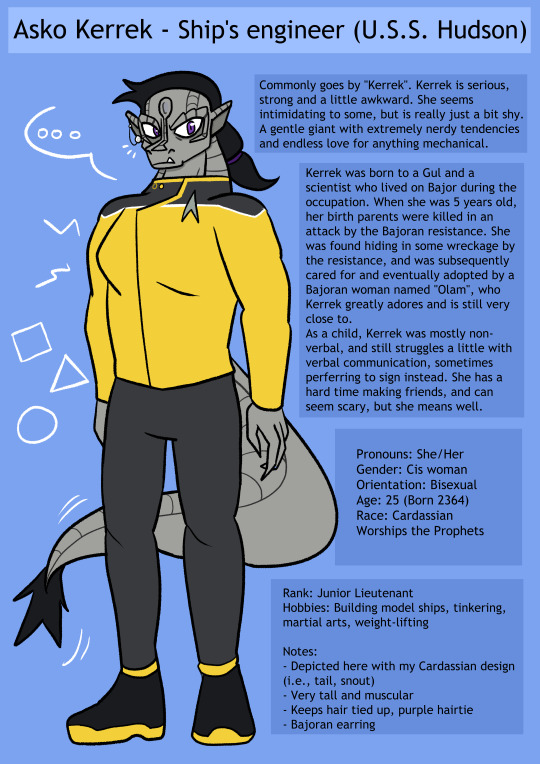
the fuckin. star trek ocs!!!!!! their story is set in 2389, on the joint civilian and starfleet run starship the U.S.S. hudson (probably oberth class, not 100% sure yet). can u tell i'm obsessed with making weird sapphic ocs lol
more doodles below the cut!
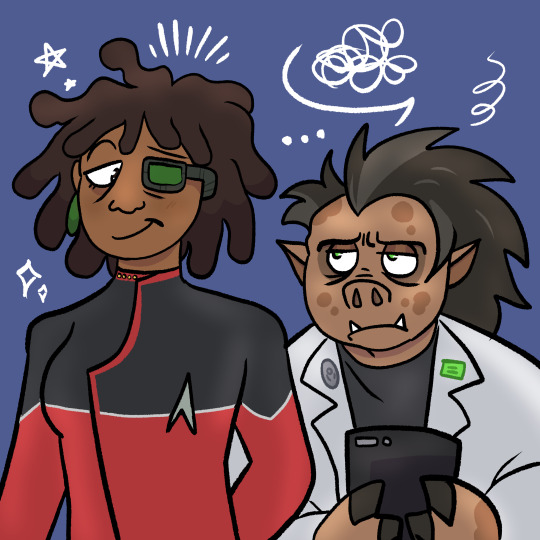
rangi and taz. they don't get along well at first... well, more like taz doesn't get along with rangi and rangi just thinks it's funny, lol
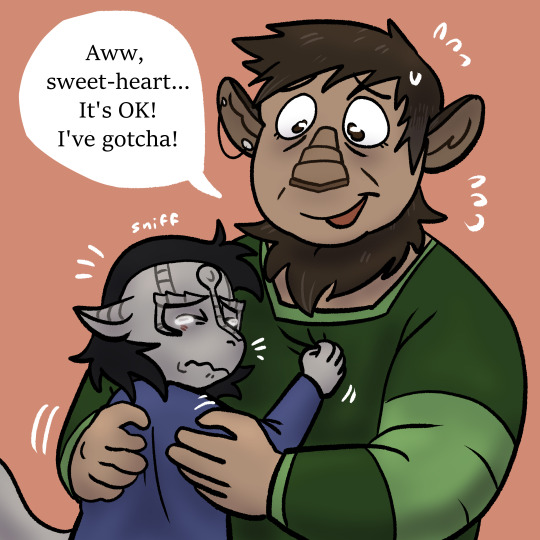
kerrek and her bajoran mum, olam! kerrek was very clingy and anxious as a child due to the trauma she'd experienced, but olam was always there for her. even now that kerrek is grown up, they're still very close. also to be clear, i draw bajorans with a mane thingy but ik olam's kinda looks like a beard. it's not but also if it was a beard that would be cool as fuck anyways so,
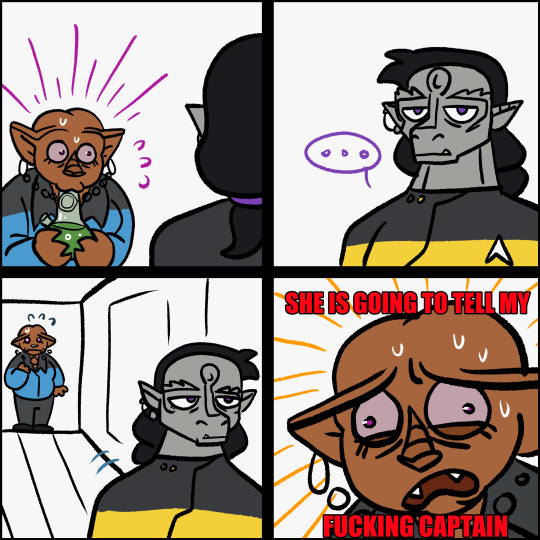
stupid little comic inspired by that one meme of the guys dog seeing him smoking weed. idk. yala likes to experiment with Substances bc things get boring as fuck on the hudson sometimes for her. kerrek doesn't actually care btw she isn't gonna tell anyone

kerrek doodles. my autism creature
45 notes
·
View notes
Text
New year same me
Here’s some art from the past year
I didn’t draw as much as I’d have liked to but the year was extremely tough on me so I’m happy with what I did do
Thank you for viewing my post if you’re here :)

Last drawing I did in 2022 (most recent as of this post)
This is my OC putunia from belliverse. My main character menot’s mom.

I had a pony phase. My brother dragged me in BSNDFMSKSK I don’t regret it

I made a villager OC (actually two but I didn’t draw the other)
Villager OC exists for @sm-baby ‘s minecraft world! :)c

The arm in this one seemed weird but I like the drawing a lot too
(OC is Grace by @sm-baby )



SO MUCH dabloon stuff!! Meet my dabloon oc, Olam :}! I spent a whole day on that second piece. Was great practice coloring!

Updated my old sona! He needed an update lol.
I hope you all have a good 2023!
More Sensitive content under the read more!!

My angel OC named Ivon. He’s from a world made by @yeennqueenn

I had a lot of fun doing this one
This character is the father of my belliverse oc Menot.
His name is Henry and he’s probably the worst person you could ever meet.
I should draw my belliverse characters with their object heads more this year! Challenge for myself.
I would add more but I’ll probs just do another post cuz you can’t go over 10 images on tumblr mobile >:(
Okay that’s it bye thank you for reading!! :)c
5 notes
·
View notes
Text
Rather proud of the post I made for JVP Boston for Holocaust Remembrance Day!
Antizionist Jewish Shoah survivors have always been some of my heroes.
And every one of them has been attacked and discredited by Zionists.
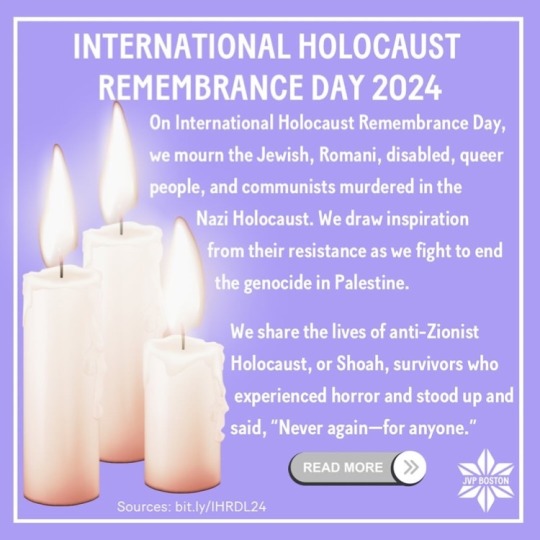

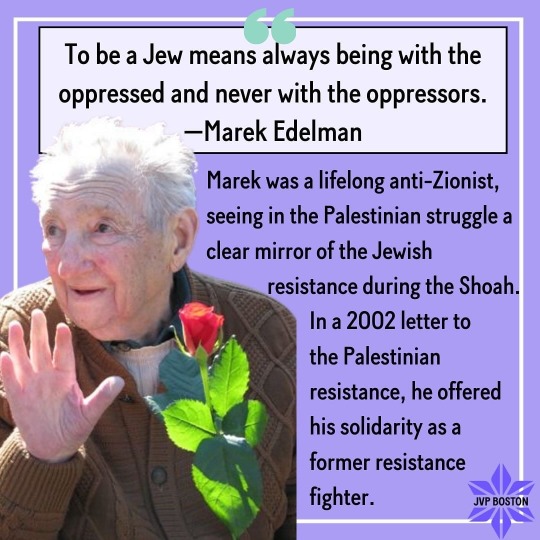
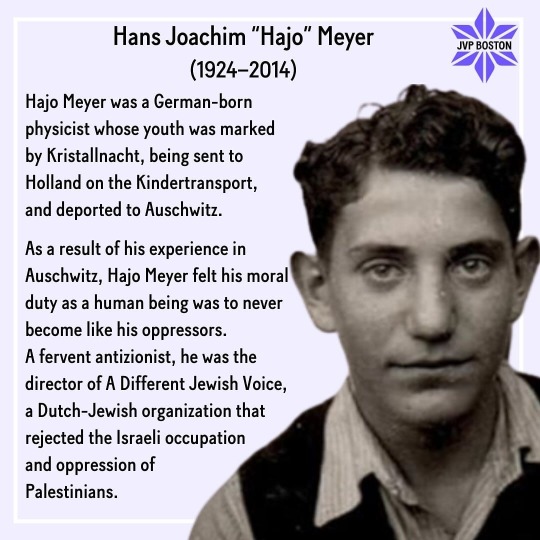
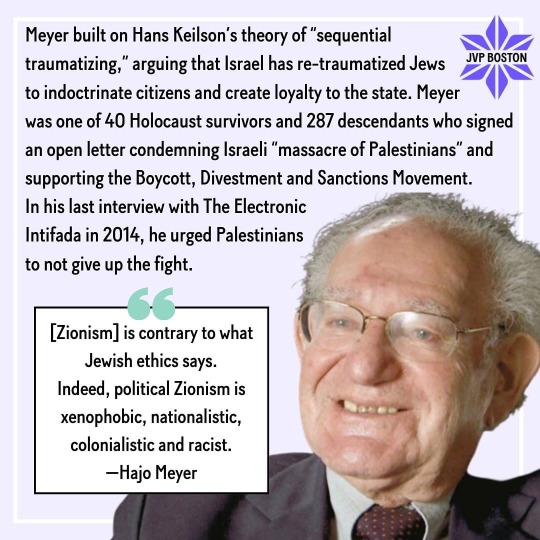
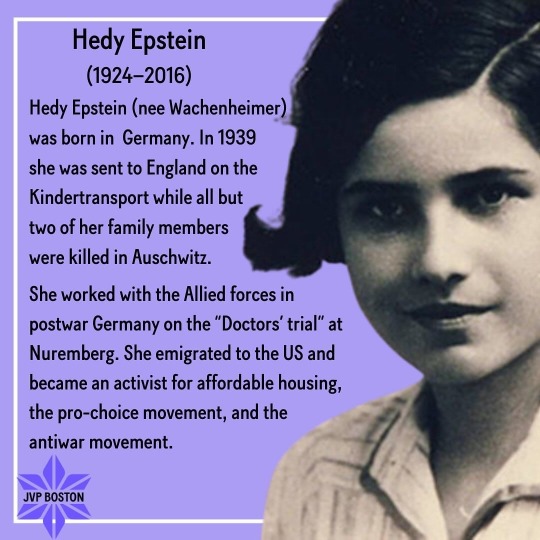

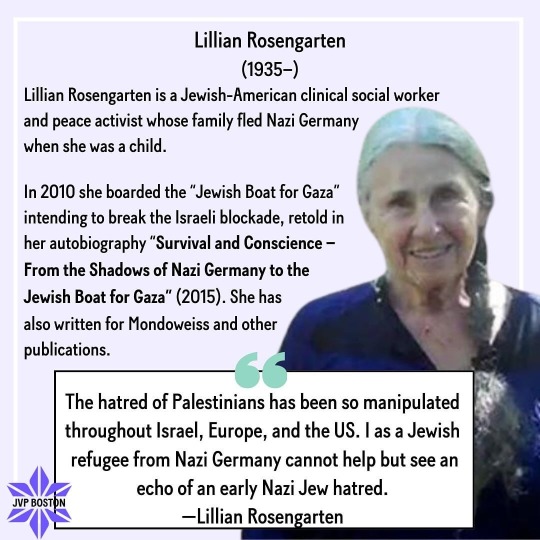
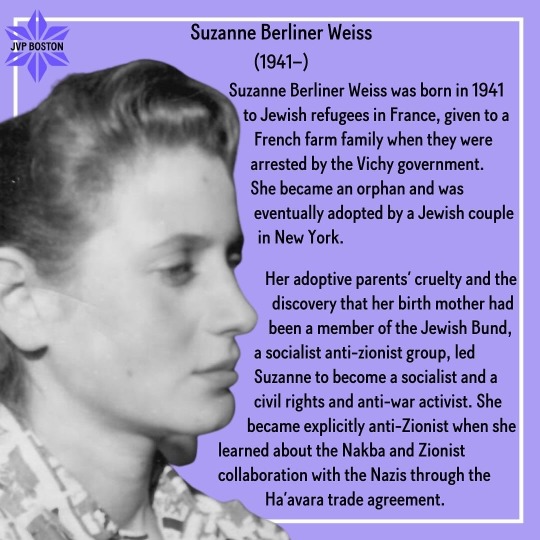

#human rights#palestine#free palestine#Shoah#Holocaust#Holocaust Remembrance Day#never again#never again for anyone#gaza genocide#palestinian genocide#genocide#jews for palestine#jews for ceasefire#jews against israel#jews against genocide#jewish antizionism#antizionist jews#Justice#social justice#tikkun olam#hajo meyer#marek Edelman#Hedy Epstein
6K notes
·
View notes
Note
re: your comment about the misinterpretation and misuse of "tikkun olam" by non-Jews, could you please explain what it *does* mean? I've heard that it roughly translates to repairing the world (like with Rabbi Tarfon's "it is not your duty to finish the work, but neither are you at liberty to neglect it"), but idk if that's what it actually is or not (sorry if any phrasing is weird, i've been awake for way too long today)
Your understanding is correct.
It does mean repairing the world. This means doing charity and choosing kindness whenever possible and generally doing small and large things without recognition in order to leave the world better than you found it. Plant a tree. Read at a nursing home. Save all your loose change for ten years then donate that amount to a cause you care about. Make kindness that helps others heal a part of your daily practice. This is tikkun olam.
I have seen bigots who consider themselves progressive try to goysplain tikkun olam as Jews attempting to impose their idea of perfection on the world around them and that we use it to justify violence. I have seen people say that Jews consider the bombing of Gaza and Rafah to be the ideal practice of tikkun olam. And it is a blatantly and horrifically false and disingenuous to say this. Tikkun olam is my absolute favorite aspect of my faith. I wake up and choose kindness and peace every single day and have since I learned about this concept. It is not always easy, but it is always worth it.
And to see others pervert it into something violent and to associate that violence as synonymous with Jewish religious ideology is truly one of the most painful things I’ve experienced in this conflict and one of the most bigoted things I’ve experienced in my life.
1K notes
·
View notes
Text
NTDs: Olam coy support Kwara Govt in reducing burden
NTDs: Olam coy support Kwara Govt in reducing burden
An Agro processing industry, Olam Food Ingredient (Ofi) has supported the Neglected Tropical Disease (NTDs) Department of the Kwara Ministry of Health in the reduction of NTDs burden in Kwara. Mrs Christiana Bamigboye, the State Coordinator of NTDs, who spoke with newsmen in Ilorin, on the sidelines of the programme explained that the state government partnered Ofi to organise stakeholders…

View On WordPress
0 notes
Text


Beautiful Jewish anti-zionist flag created by Mr7000000 via r/vexillology.
#Jewish solidarity with Palestine#free Palestine#Palestine#Yiddische solidarischkeit mit de Palestina falk#🍉#from the river to the sea#original#tikkun olam#tikkun olam requires decolonisation
180 notes
·
View notes
Text


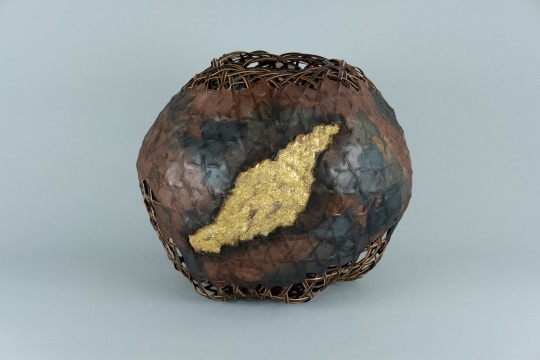


anthem, leonard cohen || wikipedia page for tikkun olam || 'tikkun olam: repair the world', barbara shapiro, 2020 || it's torn, leonard cohen || clean slate, the mountain goats
#as soon as i heard the lyric i RAN#tikkun olam#the mountain goats#leonard cohen#judaism#jewish stuff#tmg#described in alt text
868 notes
·
View notes
Text
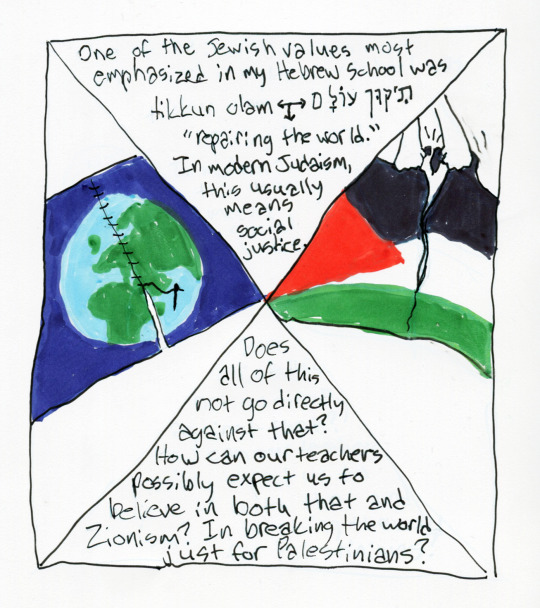
Tikkun Olam
I first drew this about a month ago, and I have so many more thoughts and feelings and anger and sadness swirling around since then. But I'll start here.
269 notes
·
View notes
Text
Elul Practices
Unlike with the high holy days, the shalosh regalim, or even the period of the Omer, there are no specific ritual mitzvot for the month of Elul. Instead, the entire month is oriented around the most fundamental biblical mitzvah: teshuvah, ie return. Return to our best selves, return to HaShem and the covenant, return to the care for each other that can heal the world.
But Judaism doesn’t leave us without resources to promote mindfulness of this work during Elul.
I. Shofar
Many Jewish communities begin weekday shacharit prayers with a shofar blast. This serves as a spiritual wake-up call, a reminder of the upcoming encounter of the Yamim Noraim. In the Torah the sound of a shofar blast proceeded from the cloud atop Mount Sinai at the making of the covenant between the newly liberated multitude and HaShem. Even before Rosh HaShana became the Jewish new year during the exile in Babylon, the first of Tishri was known as Yom T’ruah (Day of the Shofar Blast) or Zikhron T’ruah (the Memorial Shofar Blast). Because the watchman’s sounding of the shofar would also be used to call the community together in times of calamity or attack, the sounding of the shofar served to shake our forebears out of their routines and focus them in preparation for the Day of Atonement ten days later. The sounding of the shofar on each weekday in Elul brings this wake up call even earlier and invites us to set our lives in order.
II. Tehillim
Psalm 27 is also added to the morning and evening prayers during Elul. This change also reminds us of the spiritual focus of the month, with the poet’s appeal, “Hear, HaShem, when I cry aloud; show mercy to me and answer me. My heart tells me to seek your face. HaShem, I seek you.”
III. Selichot
Selichot (from the Hebrew word selichah meaning forgiveness) are special piyyutim written throughout the generations of Jewish history to aid in the spiritual work of teshuvah. In Sephardi communities, the custom is to hold a Selichot service every day beginning on the second of Elul, while in Ashkenazi communities Selichot services generally begin roughly a week before Rosh HaShana, with only four services. Whatever your minhag or personal practice, the selichot prayers can help direct the soul towards the repair that Elul invites us to seek.
IV. Other Practices
In the past half century, the Reform, Reconstructionist and Renewal movements have seen a flowering of new practices to guide teshuvah during Elul. Search the web and you’ll find Elul workbooks and meditations galore. Many Jewish communities across the spectrum also see Elul as a time for interpersonal reconciliation as well as soul-work and emphasize reaching out who we have harmed or offended in the past year to attempt to mend what we can. The work of tzedekah— our obligation to provide assistance to those in poverty from what resources we have— is also a crucial aspect of teshuvah that is explored in many Elul traditions.
Teshuvah is deeply personal, and it’s good to remember that no specific practice is obligatory. These are not mitzvot, they are tools we can draw on as we seek to fulfill the ultimate mitzvah of return to ourselves, our righteous vows, and our G-d.
While this work is deeply personal, I encourage you to counteract the overly individualist and isolating spirit of our times and remember that the heart of teshuvah is in relationship, and in recognizing the webs of reciprocity and community and obligation we’re woven into. Recognizing our collective connectedness is at the heart of the healing that we’re offered through the path of teshuvah, and we cannot repair ourselves in isolation. May your labors this month prove fruitful, whatever type of teshuvah you may choose to seek.
#judaism#jewish#jumblr#Elul#Elul practices#Jewish liturgy#tefillah#tehillim#shofar#selichot#teshuvah#tzedekah#tikkun olam
66 notes
·
View notes
Text
awkward! worst person you know is talking about how meaningful tikkun olam is to them
48 notes
·
View notes
Text
Do not say: I am meaningless. For the thread creates a hole by its absence. And a hole unravels the whole.
36 notes
·
View notes
Text

i made this because my brain is a silly place.
430 notes
·
View notes
Text

I think this is Stephen Kapos, who has protested with his family and other survivors and their children many times:
#jewish antizionism#antizionist jews#jews for palestine#judaism#jumblr#tikkun olam#stop the genocide#end the occupation#free palestine#palestine#human rights#gaza#israel#free gaza#gaza genocide#Holocaust#shoah#Holocaust survivors#protest#not in our name#never again for anyone
90 notes
·
View notes
Text
Death is but a change of circumstances, like moving homes.
Rabbi Menachem Mendel of Kotzk
325 notes
·
View notes
Note
Hello, as a non-Jewish person I have read Night because of your posts. I am not very good at articulating my thoughts, and if anything I say brings up questions for you I will try and answer them. The beginning where there is a sense of hope, is so awful because it just constantly gets worse and worse. The worsening of the regulations while the people of his village tell themselves that it is not too bad, but it is terrible, right from the first limitation, and even before it, all the events that led to it.“German laborers were going to work. They would stop and look at us with no surprise” (100), “And the spectators observed those emancipated creatures ready to kill for a piece of bread”(101). This dehumanization, I wonder how did the German citizens live with it? This sentiment continues on to this day, and yet it is dismissed so easily. “I was sixteen” His relationship with his religion is hurt so much, this general feeling of hopelessness that other people around him also feel, “Just like Rabbi Eliahu’s son, I had not passed the test”. He feels such guilt, he tries so hard to help his father, even as he is starving himself.
While I read this book, sometimes I thought that whatever is happening in this book was not that bad. Sometimes they would get a thicker soup and that would make him happy. How awful is that? For this to be normal for him. For this to not be unusual to me. In the stories of the Holocaust that I have learned, these things are not unfamiliar, the starvation, the apathy of other civilians, the death marches. His story has been categorized in my mind as another set of terrible things that were done to a Jewish person during the Holocaust. His story, every single atrocity that was done to him, I can not imagine properly, yet I only feel an undefinable upset over what happened to him. I think there is something wrong with that? I have very recently discovered that I am, in fact, antisemitic, from your posts and someone else that also realized their antisemitism (which you pointed out), and am trying to outgrow it. I am concerned that my reaction to this book is greatly affected by antisemitism. I can’t tell, am I telling myself that his suffering was ok? Am I? In the book, there are often mentions of Jewish culture that I do not know of. For example, “Shavuot” and the New Year being in summertime. I understand that these are google-able questions, but I was wondering if you have resources for a general introduction into Jewish culture and history? I hope by learning more I can dismantle my antisemitism. If you know a better way to do so, I would appreciate if you could let me know! Thank you for the recommendation to read Night, I will read All But My Life next. I am sorry if my concern over my antisemitism reads as shallow, I do not know how else to express it.
Friend, I am SO PROUD OF YOU and SO GRATEFUL FOR YOU!!!!!
I have said repeatedly that all journeys begin somewhere. More people are antisemitic than are not antisemitic, because that’s how systemic oppression works. You have been taught to hate me.
I thank you for seeing our shared humanity and working to unlearn the harmful things you know.
1. How did the Germans live with the dehumanization? The same way people are living with the dehumanization of Jews now. German antisemitism was deeply tied to antisemitic concepts and tropes that long predated Hitler. These tropes and conspiracy theories had been floating around Europe for a very long time. Furthermore, they have never gone away. All the old tropes and conspiracy theories are resurfacing in the internet age, because the Holocaust only temporarily shamed antisemites, but not enough significant cultural shifts occurred to stop it from rising again.
2. “…sometimes I thought that whatever was happening was not that bad…” I think I see what you are saying. I don’t know your age or where you are from, so I’m not sure if you’ve ever dealt with these kinds of feelings before, let alone how to articulate them — or how to do so in English. But you seem to be horrified by what is happening but you also seem to feel guilt that you find moments of relief in the horrible times as well. I don’t think that makes you a bad person. I just think that makes you a person. The human mind is not built to comprehend trauma on the scale seen during The Holocaust. It instinctively tries to find moments of reprieve that prove things aren’t that bad. And, to be fair, Judaism applauds this. It is a very Jewish idea that we should always look for moments of joy even when our hearts are steeped in misery. Because life is joy. And it is sometimes impossible to wrap our minds around how joyless life can be, and often was for Jews during this time. But your instinct to recognize the impulse to say “well, this day/moment/experience wasn’t so bad” and correct yourself to say, “actually this is a horrific terrible thing that just wasn’t as bad as that other horrific terrible thing that just happened” instead is a good instinct. One of the reasons the Holocaust occurred was because both Jews and non-Jews gave in to this instinct to minimize suffering. Jews minimized our own suffering and clung to hope until it was too late too late to fight back successfully. From the moment we were told to register on lists and wear stars and get on trains, we all should have fought. We should have fought louder and more to condemn Hitler while he was on the rise and to shame those who would vote for him. But ultimately, we were still outnumbered terribly and nothing we did could have stopped the horrors that followed if non-Jews didn’t support us. Non-Jews, of course, bare the true guilt and responsibility for the Holocaust. They refused to question their own hatred. They turned a blind eye to the rising antisemitism. They abandoned their friends in need. They complied with hostile forces who threatened them in order to betray the Jews around them.
Your job as a non-Jew is to never repeat those mistakes. Never let an instance of antisemitism go unremarked on. Ever. And learn what antisemitism looks like. Refuse to ever let it exist or ignored in your presence.
Everyone likes to pretend they would do this, but very few ever do. The reality is that some people hate Jews so much, they will stop being your friend for defending us. And to be a good person, you have to be willing to let those people leave your life if they are unwilling to let go of their hate and learn to do better. The reality is that, at some point, you may very well be asked to choose to reject a friend for the sake of the safety of Jews you have never and will never meet. The good news is that this is not the case the majority of the time!
Most people want to consider themselves good people. And most people want the approval of their peer groups.
Your job is to steer the attitude of your peer group away from antisemitic thinking and toward peace and deconstruction of hateful systemic antisemitism—rather than allowing your peer group to steer you toward the comforting familiarity of Jew-hatred.
3. “…I have recently discovered that I am antisemitic…” I forgive you. As I said, most people are. I draw a distinction between someone who is antisemitic and someone who is an antisemite. You have harmful and negative opinions about Jews because of the systemic bigotry you have been surrounded by your whole life. But this hatred has not become your identity. You recognize this hatred as a part of you that must be discarded. Antisemitism is something you have, not something you are. And you are doing the right things to make sure you stop being antisemitic. This, to me, means you are not an antisemite. If you give up and stop caring about Jews and unlearning these harmful thought patterns, that would make you an antisemite. Because that would mean you are comfortable folding the antisemitism you possess into your identity and sense of self. It seems to me you do not wish to do this. And that means you’re growing and changing for the better. And that is beautiful.
4. “I am concerned that my reaction to this book is affected by antisemitism.” Yeah it probably is. But so is most people’s reaction to this book. That’s the point. Your being willing to confront that is what is important. It is about looking at the places where you lose empathy for Jews, asking yourself why, and then fixing the reason you find.
5. “Am I telling myself his suffering was ok?” I think you’re doing the opposite. I think you’re re-sensitizing yourself to something you were de-sensitized to. That is difficult and admirable.
6. Regarding Jewish culture:
6.a. “Shavuot” is a Jewish holiday. It is the anniversary of the day G-d gave the Torah to the Israelites. In general, a good way to familiarize yourself with stuff like this is to look for resources about Jewish holidays and what they mean. Hebcal offers short summaries of each Jewish holiday that you can import into your phone calendar and learn about as they happen. Wikipedia has a page about Jewish holidays that you can explore. So does the Jewish Virtual Library.
6.b. Jewish culture is vast and impossible to summarize simply. I would recommend starting with the Wikipedia Page on Jewish Culture and exploring whatever seems interesting to you. You’ll never learn it all and that’s ok! I’ve never met a Jew who knows it all either! We have so many subcultures all over the world shaped by unique experiences in diaspora. The most important thing to take away is that no matter how far apart we are or how differently we practice, we are all one people whose goal is to love our fellow humans and do our best to make the world a better place. This is called Tikkun Olam, which means repairing the world. This in itself is a huge concept. But it all relates to making the world better for one another.
I think you are doing a beautiful and amazing thing. And you, by choosing to remove hate from your mind and your actions, are actively making the world a better place. You are repairing some of the damage done by systemic antisemitism.
You are doing Tikkun Olam. And that, in every possible situation, is the best thing you can ever do. Thank you, @JellyMarbles
#goyische support#Tikkun Olam#antisemitism#unlearning antisemitism#deconstruction#deconstructing antisemitism#Holocaust TW#Shoah TW#The Holocaust#elie wiesel#Gerda Weissman Klein#Night#All But My Life
86 notes
·
View notes